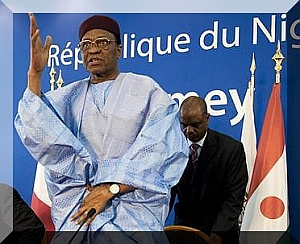Tandja: A Reflection of Africa's Potentates?

 |
| Mamadou Tandja in a past function |
Tandja held a referendum to abolish limits on presidential terms of office, disregarded the Supreme Court’s decision against extension of the two term presidential limits, abolished parliament, and concentrated immense powers on himself. In the rush to install himself as monarch, Tandja manipulated Niger’s democratic tenets, as Kwame Nkrumah, Samuel Doe, among others, had done.
That Tandja has been suffering from the much dreaded African Big Man syndrome that blinded him from the Nigerien and African reality is incontestable. His move was instructive that African leaders have not learned from their history, culture, and the emerging democratic order that pins progress on democracy, freedoms, human rights and the rule of law.
Niger Supreme Council for the Restoration of Democracy's promise of “democracy and good governance” with a view of saving the country from “poverty, deception and corruption” reveals how democracy as solution to Africa’s development challenges and vehicle for progress is gradually taking root.Tandja’s muddled thinking reveals that Africa's progress challenge isn’t always European colonialism but African elites’ lack of comprehension of themselves and Africa.
Prone to autocracy, Tandja was mired in the superstitious belief that he is the only one chosen by God to rule Niger, a country of immense poverty (61 percent of its population lives on less than US$1 a day) disturbing record of coups, assassinations and on-and-off rebellion by its nomadic Tuareg group.
How do Africans fathom the fact that Tandja believes he is the only one, out of the 14 million people of Niger, that can “complete major investment projects”? His beliefs, floated by juju-marabout spiritual mediums who buzz around him, come from the African traditional superstitious belief that he is god-sent. Such ridiculous beliefs make the African ‘big men’ look down on their citizenry.
Prof. A.K.P. Kludze, former Justice of Ghana’s Supreme Court, observes that although President Kwame Nkrumah was a freedom fighter and committed Pan-Africanist, he later succumbed to the Big Man syndrome, turned Ghana into a one-party state and became the life chairman of his ruling Conventions People's Party and general secretary of the party’s Central Committee. It was considered treason to challenge him.Nobody could stand as a candidate unless his candidature was approved by the General Secretary of the party (read-himself).
Tandja is a throwback to Africa’s period of paranoid one-party systems and military juntas that darkened post-independent Africa. The psychology informing his thinking is a page from the unelected Jerry Rawlings telling Ghanaians “To whom,” when asked to hand over power in the 1980s and give way to democracy.
In Sierra Leone, President Siaka Stevens told Sierra Leoneans, “Pass I die” (Till I die I remain President no matter what) when asked to democratize against the realities on the ground. Stevens prepared the grounds for Sierra Leone’s eventual explosion. In Liberia, as Samuel Doe messed-up the democratic system in an atmosphere of extreme autocracy, he and his cronies shouted, “No Doe, No Liberia.” Doe ended up blowing
What is the antidote to Niger’s development challenges, the Big Man syndrome and the likes of Tandja? Not military coups but education, the rule of law, human rights, freedoms, democracy and “teachable moments” of African current events. The best way to understand Niger is to get to the bottom of its painful events and that’s to start reading its history.
